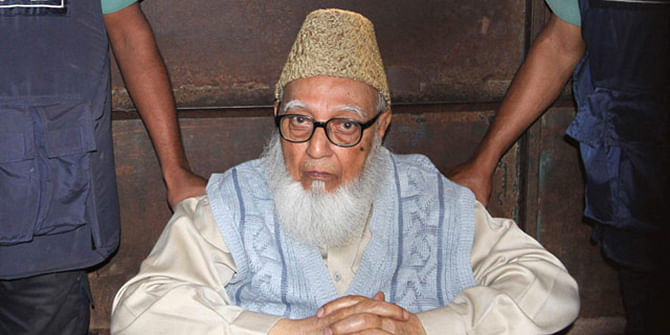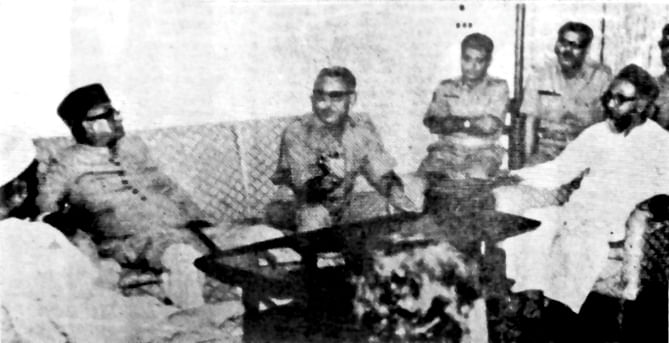Ghulam Azam dies in prison
Ghulam Azam dies in prison

He was the pivot around whom revolved the war crimes in 1971. He led the auxiliary forces that assisted the Pakistan military in committing one of the worst genocide in history.
He never repented for his despicable role; on the contrary, he continued his campaign against Bangladesh even after independence. Finally, a special tribunal last year sentenced him to 90 years in jail for genocide and crimes against humanity.
The man, symbol of war crimes in Bangladesh, is now dead.
He is Ghulam Azam.
The Jamaat ideologue breathed his last at 10:10pm yesterday at the Cardiac Intensive Care Unit of Bangabandhu Sheikh Mujib Medical University.
The 92-year-old was put on life support around 9:00pm after his condition worsened.
He was shifted to the Cardiac Intensive Care Unit on October 9 from the hospital's prison cell, where he had been kept since January 11, 2012. He was diagnosed with kidney problems, lungs infection and old-age complications.
At 11:55pm, BSMMU director (hospital) Brig Gen (retd) Abdul Majid Bhuiyan announced that Ghulam Azam had died of cardiac arrest.
Senior Jail Superintendent Farman Ali around 12:30am today told The Daily Star that the body would be sent to hospital for autopsy after a magistrate conducts an inquest.
It will be handed over to family members today, he added.
However, Tajul Islam, a counsel for Ghulam Azam, said they went to the deputy commissioner of Dhaka with an application for handover of the body without autopsy. He claimed the DC didn't receive the letter.
Tajul also said the former Jamaat chief had expressed a wish that his namaz-e-janaza be conducted by Motiur Rahman Nizami or Delawar Hossain Sayedee.
Different organisations and individuals protested this as Nizami is under trial in a war crimes case and Sayedee is convicted of crimes committed against humanity in 1971.

Azam had also wanted that he be laid to rest in his family graveyard at his Moghbazar residence, Tajul added.
On July 15 last year, the International Crimes Tribunal-1 handed down the sentence after founding him guilty of the offences of conspiracy, planning, incitement, complicity in crimes against humanity and genocide and murders during the war.
Both the government and the defence challenged the tribunal verdict, and the appeals hearing were scheduled to start on December 2. But, after Azam's death, the appeals would be “infructuous or ineffective” as per the law.
Born on November 7, 1922, Ghulam Azam studied in a madrasa first and then obtained a master's degree from Dhaka University in 1950. He was a teacher at Rangpur Carmichael College between 1950 and 1955.
He joined the Jamaat-e-Islami in 1954 and served as its secretary from 1957 to 1960. He became ameer of the East Pakistan Jamaat-e-Islami in 1969.
Ten days after the Liberation War started in 1971, he met Pakistani General Tikka Khan, known as the “Butcher of Baluchistan” to extend his support to the genocide.
He didn't stop there.
He and his party Jamaat-e-Islami, its student wing Islami Chhatra Sangha (later renamed Islami Chhatra Shibir) played the key role in forming the Peace Committees and other collaborator forces, such as Razakar, Al-Badr and Al-Shams.
He campaigned across Bangladesh and even in Pakistan (then West Pakistan) against the Liberation War.
After his meeting with Pakistan's president Yahya Khan on June 19, he addressed a press conference in Lahore. He told journalists, “The miscreants are still active in East Pakistan. People must be provided with arms to destroy them.”
Ghulam Azam and his party men and anti-liberation elements used to call the freedom fighters “miscreants”, “Indian agents”, “malaun” (an offensive word used against Hindus), and “infiltrators”.
While the nation was engaged in a life-and-death battle against the occupation forces and their local collaborators, he contested a by-election from Tangail and became a member of Pakistan National Assembly.
On November 23, Yahya declared a state of national emergency. Ghulam welcomed it and told the press in Lahore, “The best way to defend ourselves is striking at our enemies.”
He said each patriotic citizen, each member of the Peace Committees, Razakar, Al-Badr, and Al-Shams must be armed with modern automatic weapons.
At a meeting in Rawalpindi on November 29, he said, “There is no example in the history of a nation at war surviving without retaliation. Aggression is the best form of defence.”
Anticipating Pakistan's defeat, the occupation forces and their collaborators picked up leading Bengali intellectuals and professionals in December and killed them en masse with a view to intellectually crippling the emerging independent nation.
The Pakistani forces and their Bangladeshi collaborators committed genocide and war crimes that left three million people dead and around a quarter million women violated; one crore people were forced to take refuge in India.
Forty-two years after liberation, a panel of judges sentenced Ghulam Azam to 90 years in prison for masterminding crimes against humanity, genocide and other wartime offences in 1971.
“We are convinced in holding that accused Prof Ghulam Azam was the pivot of crimes and all the atrocities revolved around him during the War of Liberation,” the three judges said in the long-awaited verdict.
The judges said Azam deserved the gallows but he was given prison terms due to his old age.
POST-LIBERATION ROLE
Even after the war, Ghulam Azam tried to revive East Pakistan and spread propaganda against Bangladesh for several years.
As danger loomed for Pakistan in late 1971, he went to Pakistan on November 22, 1971. He formed the “Purbo Pakistan Punoruddhar Committee” (East Pakistan Retrieval Committee) in Pakistan soon after the war ended and campaigned until 1973 to build public opinion against Bangladesh and its recognition in the Islamic world.
In London, he published a weekly, Shonar Bangla, which was used as a propaganda tool against Bangladesh. The Bangladesh government revoked his citizenship on April 18, 1973.
Ghulam Azam later visited Saudi Arabia in March 1975. He met King Faisal and told him that Hindus had captured East Pakistan, the holy Quran had been burnt, mosques had been destroyed and converted into temples, and Muslims had been killed.
He collected funds from the Middle East for rebuilding mosques and madrasas. In order to collect funds and to continue his campaign against Bangladesh, he visited several countries of the region, including Dubai, Abu Dhabi, Kuwait, and Beirut. After completing his tour of these areas, he left for London in April 1973.
After the assassination of Bangabandhu Sheikh Mujibur Rahman, Ghulam Azam returned to Bangladesh on August 11, 1978 on a Pakistani passport.
Even though he came to Dhaka on a three-month visa during the rule of president Ziaur Rahman in 1978, he never left Bangladesh. He became the Jamaat's undeclared ameer.
In the early 1990′s, Ghulam Azam was officially declared ameer of Jamaat, while Shaheed Janani Jahanara Imam launched a unique mass movement demanding the trial of war criminals.
Initiated by Jahanara Imam, an unprecedented People's Court held a symbolic trial of Ghulam Azam in 1992. Thousands of people gathered and the court pronounced a verdict to the effect that offences committed by him during the war deserved capital punishment.
In 1991, the BNP formed the government with support from the Jamaat and in 1992 Azam filed a case with the High Court to get Bangladeshi citizenship. The government of the day arrested him and put him in jail.
However, he acquired Bangladeshi citizenship through a court order in 1994, and the government released him from prison.
He left the party's top post in 2000 and was succeeded by Motiur Rahman Nizami.
Ghulam Azam stayed out of focus after 2000 but he was back in the spotlight when the war crimes trial process started against him at the end of 2011.
He landed in jail in January 2012 in the war crimes case.